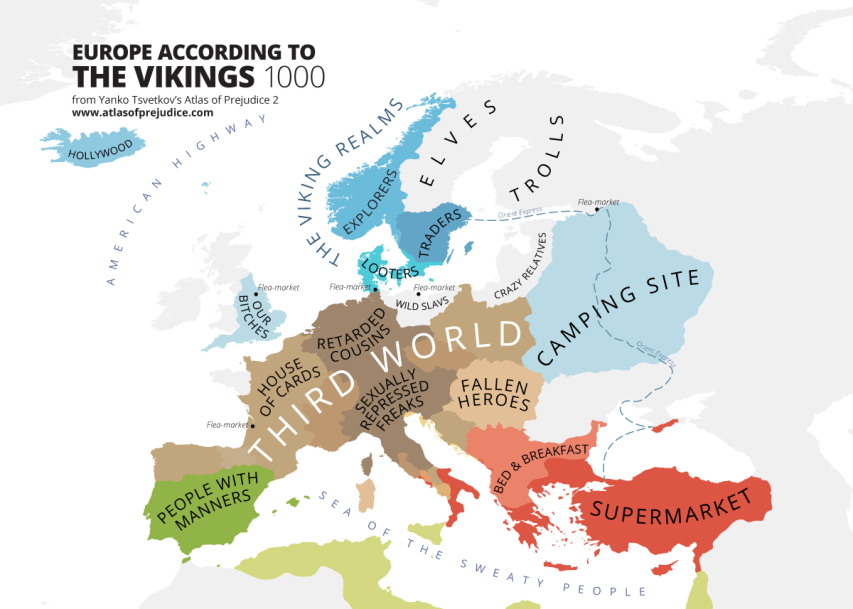I’d embed all of these, except it would take a week for the page to render, so here’s the start of the thread, and the rest will just be copy-pasta’d text:
Fear not, my little chickadees, there will be no spoilers. Except that, as Woddy Allen once remarked of “War and Peace”, “It involves Russia.”
Oh, heck, obviously this tweetstorm is going to be typo-tastic. I think we’re just gonna have to roll with it, folks.
Actually, most of this Tweetstorm is going to be about one small point that I raised in the column, but didn’t have space to explore.
Which is the extent to which those on the left who are under 45, and particularly those who are under 35, fundamentally misunderstand the Reagan coalition, because they don’t remember communism.
There’s a phenomenon in cognitive science called “hindsight bias”. People wildly overestimate their ability to predict events when they know what the outcome was.
Indeed, if you ask them to predict an event, then tell them the outcome, and then ask them what they predicted, some of them will misremember having correctly predicted the outcome.
They will also think they could have predicted an outcome that was designed to be random. Don’t think that you are not one of these people. All of us are, at least to some extent, plagued by hindsight bias. It takes conscious effort to overcome, and you never will, fully.
So once you know that Soviet Communism was doomed to the ash heap of history, because it is an infinitely inferior way of satisfying your society’s basic material needs, you become nearly incapable of imagining what it was like to live in the shadow of the Berlin Wall.
Unless you actually did.
Nonetheless, let me try to explain what it was like to our younger viewers. When I grew up, the Soviet Bloc was just one massive red blob on the map. One that the Soviets had repeatedly demonstrated an interest in expanding.
Whatever you think of American foreign policy post-1945, Soviet foreign policy was like that too, except with nastier. Our client regimes were terrible. Their client regimes were terrible. But we didn’t shoot people to keep them from leaving, or run a totalitarian police state.
It obviously, in hindsight, was not plausible to think that they were going to take over the whole world. They didn’t have the resources. But alas, we did not get the benefit of hindsight when it was happening. Almost until the Wall came down, people were predicting convergence.
There was a large, expansionist power. They were basically singlehandedly keeping Cuba afloat, subsidizing actual, honest-to-God communist groups that wanted to bring the rugged splendors of life without consumer goods to America, and oh, had a history of invading their neighbors
And then there were the nukes. So true, funny story–they were phasing out nuclear drills when I was in grammar school, because someone in the NYC Department of Ed had realized there’s not much point in drilling to become radioactive vapor. Pretty much just happens naturally.
But I had an older teacher who insisted on telling us to get under our desks if the Bomb hit. Also, inexplicably, to tuck our pants into our socks to protect us from fallout.
“I’m afraid your daughter is dead, Mrs. McArdle. But just look at those pristine ankles!”
Were Red Dawn and Top Gun over the top and a little silly? Yes. But folks in the 1980s (at least those of the appropriate age for viewing such things) didn’t watch them *ironically*. They believed the Soviets wanted to bury us. Because they had said stuff like “We will bury you”
We grew up actually afraid that the Soviet Union was going to turn our country into a sheet of radioactive glass. In hindsight, seems obviously overblown, but again: *we didn’t have hindsight*.
Also, even in the 1980s, there was a delusional portion of the left that actually thought life was better for ordinary people in the Soviet Union. That portion had, thankfully, gotten smaller after Hungary. But there was a larger portion that thought maybe it wasn’t really worse.
To be clear, I’m not talking about “Democrats”. I’m talking about hard leftists who I grew up with on the Upper West Side. They existed, and were kind of noisy.
And then there was a larger still part of the left that wasn’t Marxist, but thought that the things they were concerned about, like gender inequality and racism, didn’t exist under communism, or were better.
(NARRATOR: they existed. They weren’t better)
They thought these things because it’s hard to get good information about a police state. People saw America’s oppressions being reported on the front pages of American newspapers, and concluded that they must be worse than places we had no information on.
The existence of various sorts of at least vaguely communist-sympathetic folks inside the country, and an eerie background expectation that at any moment, a large, Imperialist communist power outside our borders might vaporize you, made this a very, very politically salient issue
If you are trying to interpret the Reagan Right without understanding the large emotional impact that this had on voters, you are getting it badly wrong.
As an aside, as I also mentioned in this column, this is *ALSO* true of people who aren’t old enough to remember urban crime in the 1980s.
I was mugged for the first time at the age of 8. In the girl’s bathroom of my grammar school. Which was supposedly the safest on the UWS.
A kid in my high school class was hospitalized after a gang of boys his own age beat and mugged him. At 10 in the morning. Off of Park Avenue.
It’s easy to have a complex, nuanced, high-level response to crime when you’re reading about crime statistics. When you are actually personally, viscerally afraid of being hurt or killed every time you walk out of your front door, your reaction tends not to be so measured.
Was there a racialized aspect to politicians talking about crime? Absolutely. That was not, however, the only thing driving it. When politicians ranted about crime, what they were often really actually talking about was … crime. Which was genuinely scary for everyone.
Which is why, as the excellent “Locking Up Our Own” documents, so many “tough on crime” laws that did huge and disproportionate damage to young black men were originated or supported by the black community. They were most at risk from law enforcement, but also from crime.
We can argue over how important “the Southern Strategy” was to the GOP’s rise. But you can’t argue that race was the whole story. Or even the overwhelming majority of the story. There was a lot going on.
But some of those problems faded, largely of their own accord. And the generation that doesn’t remember them first-hand tends to discount those problems that faded, leaving only the problem which is still with us, to which they overattribute Reagan’s success.
The left frequently suggests that conservatives are insufficiently imaginative when discussing the problems of the poor, leaving out huge areas of complexity and nuance. They’re right. I see young lefties making the same error about the problems of their parents & grandparents.
It’s one part hindsight bias (“*I’d* have known this wasn’t that big a threat”) and one part the simple difficulty of imagining how something feels if you haven’t lived it.







